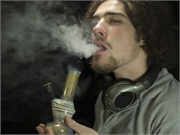- Could Your Grocery Store Meat Be Causing Recurring UTIs?
- Are You Making This Expensive Thermostat Error This Winter?
- Recognizing the Signs of Hypothyroidism
- 10 Strategies to Overcome Insomnia
- Could Artificial Sweeteners Be Aging the Brain Faster?
- Techniques for Soothing Your Nervous System
- Does the Water in Your House Smell Funny? Here’s Why
- Can a Daily Dose of Apple Cider Vinegar Actually Aid Weight Loss?
- 6 Health Beverages That Can Actually Spike Your Blood Sugar
- Treatment Options for Social Anxiety Disorder
College Students Picking Pot Over Drinking in States Where It’s Legal

Are college students choosing marijuana instead of booze when both are legal?
New research suggests they are: In states where pot is legal, college kids use it more, but binge-drink less.
In states with legal marijuana, college students were 18% more likely to use it in the past month than in states where it’s illegal, Oregon State University researchers report.
From 2012 to 2018, the rate of pot users rose from 14% to 17% in states where it was illegal and from 21% to 34% in the states where it was legal.
Using the National College Health Assessment survey from 2008 to 2018, researchers examined data on more than 850,000 students from 135 colleges in seven states where marijuana was legalized in 2018 and 454 colleges in 41 states where it was not.
They found that older students, ages 21 to 26, were 23% more likely to use marijuana than their peers in states where pot wasn’t legal.
The effect was also stronger among women and students living off-campus. That might be because schools honor federal drug laws that classify marijuana as an illegal drug.
The team’s report was published Jan. 13 in the journal Addiction.
A second study published recently in Addictive Behaviors by the same researchers found that after pot was legalized, there was a greater drop in binge drinking among students 21 and older than among similar students where pot was illegal.
Why binge drinking went down isn’t clear, the researchers noted.
“So in these two studies we saw changes after legalization that really differed by substance,” said research leader David Kerr, director of graduate education at Oregon State University’s School of Psychological Science.
“For marijuana, we saw state-specific increases that went beyond the nationwide increases, whereas binge drinking was the opposite: a greater decrease in the context of nationwide decreases,” Kerr explained in a university news release.
More information
For more on marijuana, see the U.S. National Institute on Drug Abuse.
Source: HealthDay
Copyright © 2026 HealthDay. All rights reserved.










